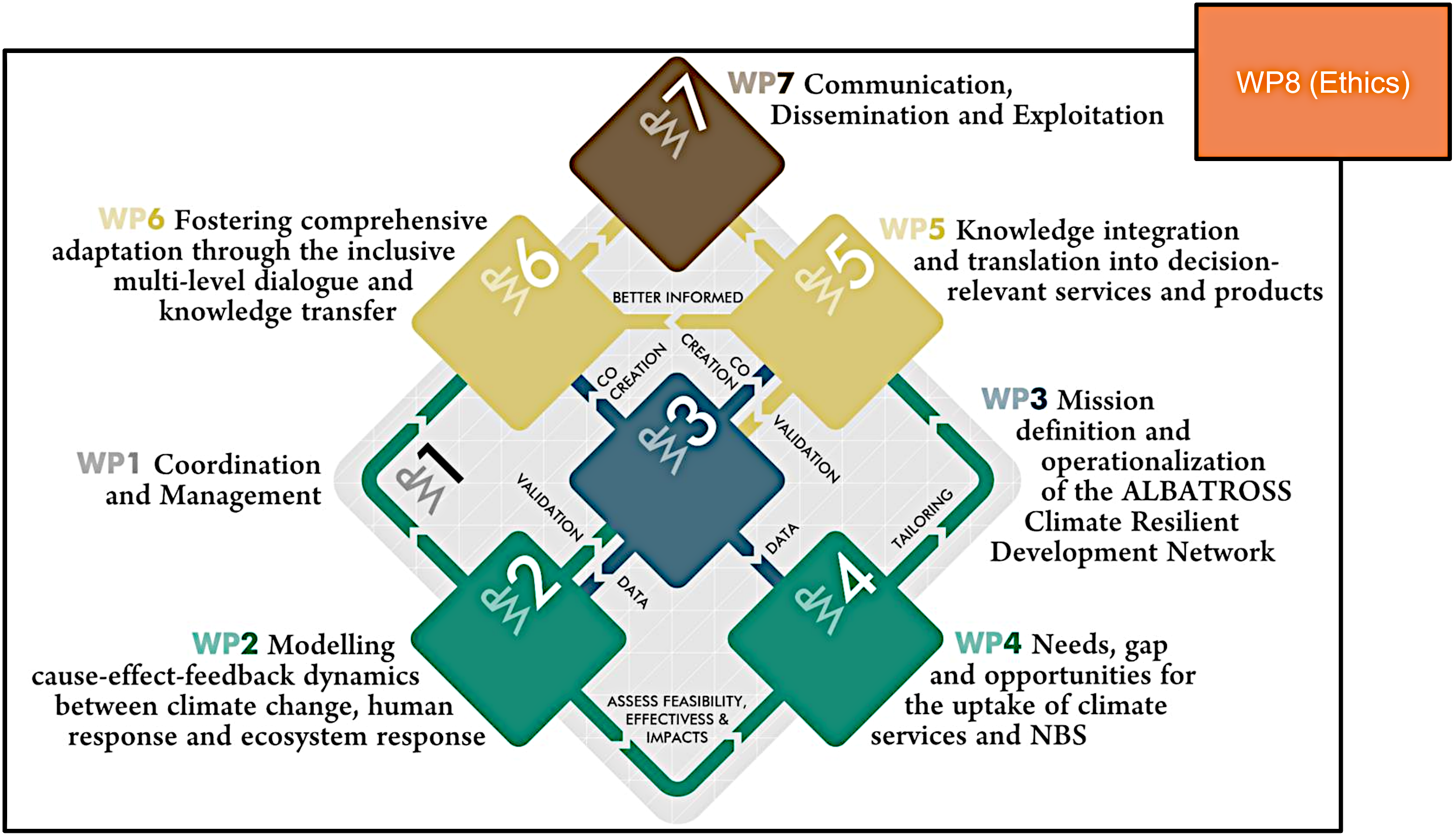ALBATROSS is structured in such a way that the partners are working on the implementation of eight interrelated work packages, which, progressing together and with a clear objective, will achieve all the objectives set at the core of the ALBATROSS project. All work packages are co-led by two partners, which will foster closer cooperation among partners and will help account for different needs and approaches.
Work packages

Work package 1 sets its goal on coordinating and supervising the project research and innovation activities to be carried out according to the work plan, also by monitoring and ensuring quality and timing of project deliverables.
It will also carry out the overall administrative and financial management and reporting of the project; manage contacts with the EU Commission and establish effective internal and external communication; resolve possible conflicts and manage the IPR related to the achieved results.
WORK PACKAGE 1 LEADER: UNIBO
DURATION: 1 March 2024 – 31 August 2027
The overall objective of this work package is to develop and implement an integrated assessment model that encompasses compounding and/or cascading impacts (benefits and threats) on ecosystem health, food security and socio-economic vulnerability to climate threats. The ALBATROSS integrated model will assess these impacts in relation to specific natural hazards (e.g., drought or flood) or sectoral climate adaptation needs and measures (e.g., crop production and livelihood), with a specific emphasis on nature-based solutions.
Model verification and validation will be carried out in close collaboration with work package 3.
WORK PACKAGE 2 LEADER & CO-LEADER: UNILI & KNUST
DURATION: 1 March 2024 – 31 August 2026
The overarching goal of work package 3 is to ground the work of ALBATROSS in real contexts of Sub-Saharan countries through the operationalization of the Climate Resilient Development (CRD) Network, a transnational structure grounded on the Living Labs concept (learn more about the CRD Network).
Through the ALBATROSS living-network approach, this work package will be devoted to the establishment of the CRD Network; assessment of sectors that are highly vulnerable to climate change in the different Hubs (e.g., energy, water, food, urban development); co-creation and co-evaluation of climate services, nature-based solutions and other adaptation options.
WORK PACKAGE 3 LEADER & CO-LEADER: TUDO & ARU
DURATION: 1 March 2024 – 31 August 2027
The primary aim of this work package is to assess technical and non-technical challenges which hinder the integration of climate risk information into African adaptation planning and decision making and to identify solutions and recommendations for overcoming them. Specific objectives include the assessment of existing climate services and data for Sub-Saharan Africa; assessment of existing nature-based solutions and their distributional impacts in Sub-Saharan Africa; assessing the level to which existing climate and environmental data, services and products in Sub-Saharan Africa inform nature-based solutions and other adaptation planning and decisions, and assessing forecasting skills and windows of opportunity for climate predictions.
WORK PACKAGE 4 LEADER & CO-LEADER: UNICT & UNINA
DURATION: 1 March 2024 – 31 August 2027
The objectives of this work package will include the knowledge integration from findings in all work packages, the development and deployment of novel climate services for the CRD Network and other African countries, the development of tools for climate risk decision-making, improving climate risk awareness and mapping biodiversity integrated with climate risk data. An original database will be built based on nature-based solutions and indigenous-and-local-knowledge-based solutions to be incorporated into existing platforms (Climate-Adapt, GeoIKP, Oppla, etc).
WORK PACKAGE 5 LEADER & CO-LEADER: UNIBO & KAJO.
DURATION: 1 March 2024 – 31 August 2027
The primary aim of this work package is to foster comprehensive adaptation through a twofold approach based on inclusive multi-level policy dialogue and knowledge transfer. Therefore, on the one hand, critical analysis of existing policy synergies between EU-AF will be carried out and potential pathways towards integration of adaptation plans explored based on updated climate information and ensuring/supporting biodiversity protection and social innovation. On the other hand, acquired knowledge will be integrated into policy instruments, such as policy briefs and training materials, and a distribution infrastructure will be established for knowledge transfer
WORK PACKAGE 6 LEADER & CO-LEADER: UNESCO and OZA
DURATION: 1 March 2024 – 31 August 2027
Work package 7 aims to ensure effective internal and external communication and knowledge transfer and exploitation, by setting up, updating and feeding the channels and tools needed for that, in accordance with the plans for optimal communication, knowledge transfer and exploitation activities that have been designed and deployed.
WP 7 LEADER & CO-LEADER: ELHUYAR & ITMET
DURATION: 1 March 2024 – 31 August 2027